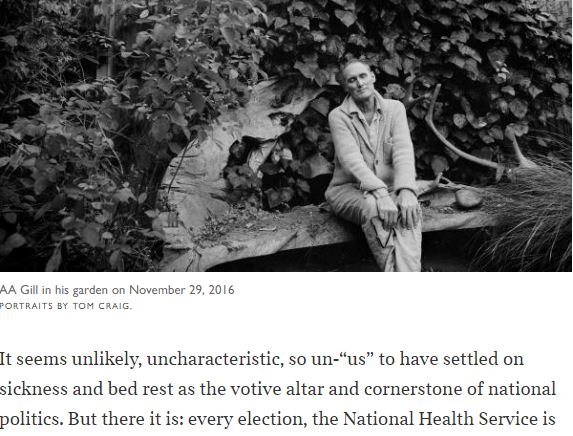AA Gill takes swipe at NICE in final column

Acerbic restaurant critic and writer, AA Gill, who died this week, took a swipe at cancer drug rationing on the NHS in his final Sunday Times column, revealing he was initially denied treatment with Bristol-Myers Squibb’s Opdivo.
His comments raise awareness about the ongoing issue of access to cancer drugs on the NHS.
Gill's final article was full of praise for the NHS, highlighting the compassionate care he received, but also delivered a sharp critique of the health service's failings.
He revealed he was at first denied the immunotherapy, also known as nivolumab, costing up to £100,000 a year.
AA Gill on the NHS and a search for a treatment - what turned out to be his last piece. pic.twitter.com/L8ZBGqHDR2
— Tom Boadle (@TomBoadle) December 11, 2016
A former smoker, 62-year-old Gill was diagnosed in the autumn with lung cancer that spread to his neck and pancreas, with tumours that were inoperable and unsuitable for radiotherapy.
NICE in October restricted access to Opdivo, saying it will be funded on an interim basis by the Cancer Drugs Fund, and should only be used in non-small cell lung cancer patients whose tumours over-express PD-L1.
This accounts for around a third of patients. NICE earlier this month recommended MSD’s close rival, Keytruda (pembrolizumab) in lung cancer.
Describing NICE as the “quartermaster for the health service”, he said his doctor thought Opdivo would be “particularly successful” with his kind of cancer, and would have recommended it if the writer had private health insurance.
“What NICE doesn’t say about the odds is that immunotherapy mostly works for old men who are partially responsible for their cancers because they smoked. Thousands of patients could benefit,” wrote Gill. “But old men who think they’re going to die anyway aren’t very effective activists. They don’t get the public or press pressure that young mothers’ cancers and kids’ diseases get.”
NICE hasn't responded to the article, but would of course be able to point to its QALY methodology as being its key decision-making framework, rather than pressure from activists.
Gill was correct, however, to note the UK's comparatively poor performance in international oncology rankings, which put it among the worst cancer survival rates in western Europe. These are a third lower than those of Sweden, with late diagnosis chief among the reasons for poor survival.
Since finishing the Sunday Times column, Gill did start taking the drug, according to an addendum.












